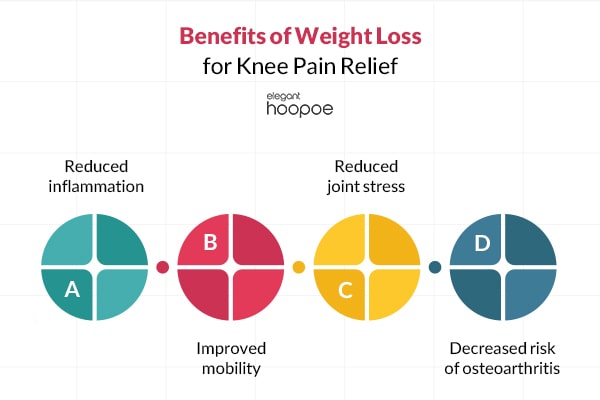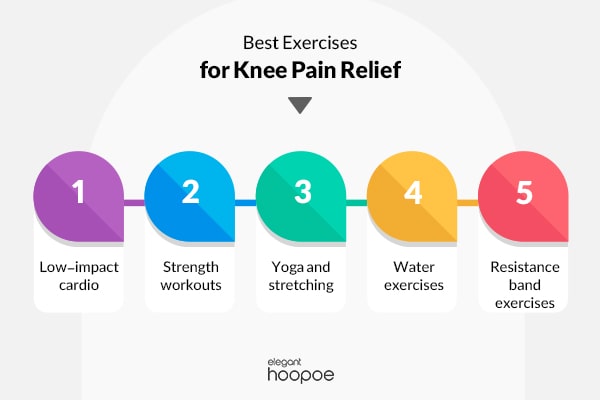Why Do You Have Knee Pain After Weight Loss? Causes & Solutions
Experiencing knee pain after weight loss can be surprising, but it’s not uncommon. While shedding extra pounds reduces joint stress, it can also reveal underlying issues or muscle imbalances. Here’s why it happens and how to find relief:
- Muscle Weakness: Rapid weight loss can lead to muscle loss, reducing knee support.
- Cartilage & Joint Stress: Previous excess weight may have caused joint damage, which becomes noticeable post-weight loss.
- Biomechanical Changes: Shifts in posture and gait can temporarily strain the knees.
To alleviate discomfort, focus on strength training, low-impact exercises, proper footwear, and gradual weight loss strategies. If pain persists, consult a healthcare professional for personalized treatment.
Knee pain is a common problem that affects people of all ages and backgrounds. It can be caused by a variety of factors, including injury, arthritis, and excess weight. In many cases, carrying excess weight can put additional stress on the knees, which can worsen knee pain and potentially lead to further complications. But Is weight loss good for knee pain?
Weight loss can be an effective strategy for managing knee pain. By reducing the load on the knees, weight loss can relieve pressure and stress that may be contributing to the pain.
However, it is important to note that weight loss alone may not completely alleviate knee pain. Other treatments, such as physical therapy, medication, and surgery, may be necessary depending on the underlying cause and severity of the knee pain. It is recommended to consult with a healthcare professional to determine the best course of treatment for knee pain.
In this article on Elegant Hoopoe, we will explore the relationship between weight loss and knee pain, as well as effective strategies for managing knee pain through weight loss and exercise.
How Excess Weight Affects Knee Health
Excess weight can have a significant impact on knee health. The knees are weight-bearing joints, which means that they support the weight of the body and are responsible for movements such as walking, running, and jumping. When a person is overweight, the knees are subjected to additional stress and pressure, which can contribute to the development of knee pain and other knee problems.
Carrying excess weight can also increase the risk of developing osteoarthritis, a condition in which the cartilage that cushions the joints wears away over time. Osteoarthritis can cause pain, stiffness, and swelling in the knees, and can limit a person’s ability to perform daily activities.
In addition to osteoarthritis, excess weight can also contribute to other knee problems, such as patellofemoral pain syndrome, a condition that causes pain in the front of the knee, and iliotibial band syndrome, a condition that causes pain on the outside of the knee.
Furthermore, excess weight can lead to a sedentary lifestyle, which can contribute to weaker muscles and joints. Weaker muscles can lead to imbalances and instability in the knee joint, which can increase the risk of injury and exacerbate existing knee problems.

Benefits of Weight Loss for Knee Pain Relief
Weight loss can have several benefits for knee pain relief. Losing weight can help reduce the load on the knees, which can alleviate pressure and stress that may be contributing to the pain. Here are some weight loss benefits for knee pain relief:
- Reduced inflammation: Excess weight can contribute to inflammation in the body, which can worsen knee pain. Losing weight can help reduce inflammation, relieve pain, and improve knee function.
- Reduced joint stress: As mentioned, carrying excess weight can put additional stress on the knees, which can worsen knee pain and potentially lead to further complications. By losing weight, the load on the knees is reduced, which can alleviate pressure and stress on the joint.
- Improved mobility: Knee pain can make it difficult to move around, which can limit a person’s ability to perform daily activities. Losing weight can improve mobility, allowing individuals to move around more freely and comfortably.
- Decreased risk of osteoarthritis: Carrying excess weight can increase the risk of developing osteoarthritis, a condition that causes pain and stiffness in the joints. Losing weight can reduce the risk of developing osteoarthritis, as well as slow down its progression if it has already developed.
Strategies for Successful Weight Loss and Knee Pain Management
Successful weight loss and knee pain management require a comprehensive approach that includes both lifestyle modifications and medical treatments. Here are some strategies that can help achieve both goals:
- Set realistic goals: Setting realistic goals for weight loss and knee pain management can help you stay motivated and track progress. Consult with a healthcare professional to determine what goals are appropriate for you.
- Consider physical therapy: Physical therapy can be beneficial for improving knee function and reducing pain. A physical therapist can design a program tailored to your specific needs and goals.
- Use the medication as prescribed: Medication can help manage knee pain, but it’s important to use it as prescribed and under the guidance of a healthcare professional.
- Consider surgery: In some cases, surgery may be necessary to alleviate knee pain. Consult with a healthcare professional to determine if surgery is viable for you.
It’s important to consult with a healthcare professional before starting any weight loss or exercise program, especially if you have knee pain or other medical conditions. They can provide personalized recommendations and guidelines for safe and effective weight loss and knee pain management.
Importance of Exercise for Knee Pain Management and Weight Loss
Exercise is an essential component of knee pain management and weight loss. Engaging in regular physical activity can help strengthen the muscles around the knee joint, improve joint flexibility and range of motion, and reduce inflammation, all of which can help alleviate knee pain. Additionally, exercise can aid in weight loss, which can further reduce stress on the knees and improve overall knee health.
Here are some ways in which exercise can benefit knee pain management and weight loss:
- Strengthening muscles: Engaging in exercises that target the muscles around the knee joint, such as the quadriceps and hamstrings, can help strengthen these muscles and provide better support for the knee. Stronger muscles can help stabilize the joint and reduce stress and pressure on the knee, which can alleviate pain.
- Improving joint flexibility and range of motion: Exercises that focus on improving joint flexibility and range of motion, such as stretching and yoga, can help improve joint function and reduce stiffness in the knee joint.
- Reducing inflammation: Regular exercise can help reduce inflammation throughout the body, which can contribute to knee pain. Exercise triggers the release of anti-inflammatory compounds that can help reduce inflammation and alleviate pain.
- Promoting weight loss: Exercise can help burn calories and aid in weight loss, which can reduce stress on the knees and improve overall knee health.

Best Exercises for Knee Pain Relief
When it comes to knee pain relief and weight loss, several exercises can be helpful. Here are some of the best exercises for knee pain relief and weight loss:
- Low-impact cardio: Low-impact exercises such as walking, cycling, swimming, and using an elliptical machine can be helpful for both knee pain relief and weight loss. These exercises are less stressful on the knee joint and can help improve cardiovascular health, which can aid in weight loss.
- Strength workouts: Strength training exercises that focus on the muscles around the knee joint, such as squats, lunges, leg presses, and step-ups, can help improve knee stability and reduce knee pain. Building muscle also helps increase metabolism and promote weight loss.
- Yoga and stretching: Yoga and stretching can help improve joint flexibility and range of motion, which can reduce knee pain. Additionally, these exercises can help promote relaxation and reduce stress, which can also contribute to pain relief.
- Water exercises: Water exercises, such as swimming and water aerobics, can be particularly helpful for knee pain relief and weight loss. The buoyancy of the water can help reduce stress on the knee joint, while the resistance of the water can provide a low-impact workout that can help promote weight loss.
- Resistance band exercises: Resistance bands can be used for a variety of exercises that can help strengthen the muscles around the knee joint, such as leg extensions, leg curls, and lateral leg raises. These exercises can help improve knee stability and reduce knee pain.
It’s essential to consult with a healthcare professional before starting any exercise program, especially if you have knee pain or other medical conditions. They can provide personalized recommendations and guidelines for safe and effective exercise.
When to Seek Professional Help for Weight Loss Knee Pain
If you’re experiencing knee pain and are overweight or obese, it’s important to seek professional help for weight loss and knee pain management.
Seeking professional help can involve consulting with a healthcare professional such as a doctor, physical therapist, or registered dietitian. They can provide personalized recommendations and guidance for safe and effective weight loss and knee pain management. Here are some signs that it may be time to seek professional help:
- Knee pain is persistent or worsening: If your knee pain is persistent or worsening despite lifestyle modifications, medication, or other treatments, it may be time to seek professional help.
- Difficulty with daily activities: If knee pain is interfering with your ability to perform daily activities such as walking, climbing stairs, or standing, it’s important to seek professional help.
- Limited range of motion: If you’re experiencing a limited range of motion in your knee joint, or are unable to fully straighten or bend your knee, it may be a sign of a more serious issue that requires medical attention.
- Inability to lose weight: If you’re having difficulty losing weight despite efforts to modify your diet and exercise habits, seeking professional help can be beneficial.
- Concerns about medication side effects: If you’re taking medication for knee pain but are experiencing unwanted side effects or are concerned about potential risks, it’s important to discuss these concerns with a healthcare professional.
- Other medical conditions: If you have other medical conditions such as diabetes, heart disease, or high blood pressure, it’s important to seek professional help for weight loss and knee pain management to ensure that these conditions are properly managed.

Tips for Maintaining a Healthy Weight and Preventing Knee Pain
Successful weight loss and knee pain management require a comprehensive approach that includes both lifestyle modifications and medical treatments. Here are some strategies and tips that can help achieve both goals.
It’s important to note that these tips are not a substitute for medical advice or treatment. If you’re experiencing persistent knee pain or have other medical conditions, consulting with a healthcare professional is recommended.
- Eat a healthy diet: A healthy, balanced diet rich in fruits, vegetables, lean protein, and whole grains can help maintain a healthy weight and prevent inflammation that can contribute to knee pain.
- Exercise regularly: Regular exercise can help with weight loss and improve knee pain by strengthening the muscles around the knee joint, improving flexibility, and reducing inflammation. Incorporating both cardiovascular exercise and strength training is recommended.
- Maintain good posture and healthy weight: Maintaining good posture can help reduce stress on the knees and improve overall knee health. Be mindful of posture when sitting, standing, and walking. If you’re overweight, losing weight can help reduce stress on the knees and improve knee health.
- Manage stress: Stress can contribute to weight gain and inflammation, which can exacerbate knee pain. Managing stress through techniques such as meditation, deep breathing, and yoga can be helpful.
- Wear appropriate footwear: Wearing appropriate footwear that provides adequate support can help reduce stress on the knees and prevent knee pain.
- Avoid high-impact activities: High-impact activities such as running or jumping can place significant stress on the knees. Consider low-impact activities such as swimming or cycling.
- Consult with a healthcare professional: If you’re experiencing knee pain or are concerned about your weight, consulting with a healthcare professional can help develop a personalized plan for maintaining a healthy weight and preventing knee pain.
Causes of Knee Pain During Weight-Bearing
People who are considering heat sculpting vs coolsculpting usually like to have an active lifestyle, and are often following exercise routines, while these exercises may sometimes result in knee pain. This particular complication may occur because of overuse, improper techniques during the exercise or irregularities in the body weight distribution.
Understanding the root of any knee pain should be a top priority when undergoing certain body contouring treatments, so the individual will have a clear view on what to avoid when trying to follow their routine before or after coolsculpting vs. warm sculpting or all the other fat reduction procedures. Addressing knee pain early can help ensure that the body remains strong and capable of maintaining the results of fat reduction procedures.
Knee pain during weight-bearing activities can be caused by various factors. It may be caused by certain underlying conditions that are rare and usually related to certain individuals, or it may be the result of improper use of the body during certain activities, and even choosing the wrong shoes.
Preventing Knee Pain: The Impact of Exercise, Weight, and Underlying Conditions
Improper use during exercise usually means when you put repeated stress on the knee joints during running or activities like squatting. There are also other conditions like patellar tendinitis or bursitis which may develop overtime during repetitive movements.
On the other hand, individuals with certain conditions like misalignment in the hips or ankles, which put uneven pressure on the knee joints, may start to experience knee pain gradually as they do exercise, or go on with their daily activities. Being overweight can also be a common reason for developing knee pain over time.
So managing weight with a mixture of fat reduction procedures, diet and exercise can be very good for stopping knee pain from developing during weight bearing exercises, but it is important to consult a doctor at the same time to make sure that one does not possess one of the unfortunate and unwanted conditions that may contribute to knee pain.
Quick Relief Tips for Knee Pain
Since regular exercise after body contouring treatments can help you achieve better results, it’s important to know a few tricks about quick pain relief techniques to help you keep going on with your daily activities and exercise routines, in case you experience any knee joint pains.
Some over-the-counter remedies can be helpful, like ice-pack applications, and elevation of the legs. You may also use some anti-inflammatory drugs like ibuprofen. In this light, if you work out and you develop some pain, it is advisable to rest the joints and stay away from high-impact activities. However, you should also do some gentle stretching on the side. You can also wear special compression knee sleeves which stabilize the joint and help relieve the pain.
Low-impact activities like cycling in a way the knee is correctly aligned with the hips or swimming, can also help lower any discomfort while at the same time help you keep up with your exercise routines. But if these quick relief remedies don’t help that much and the pain persists, you should consider consulting a doctor to receive proper treatment.
Preventing Knee Pain in Daily Activities
Both coolsculpting vs. hot sculpting are often pursued by people who are exercise enthusiasts and hence preventive knee pain measures can further help them in long-term body sculpting goals. They might attain this goal through natural treatment methods including the use of good posture, the right shoes, and strengthening exercises that allow them to keep active and, therefore, they are still able to be part of the workouts long after the treatments. Sustaining an active lifestyle post-body contouring is a crucial step in keeping the results intact.
To avoid knee pain during daily activities, stand straight and breathe properly and if you have to do tasks such as climbing or Lifting you should use the right body mechanics. By doing some strength exercises, the muscles that surround the knee joint become stronger and it then helps to support the knee better and reduce its stress. Supportive shoes are mandatory for you, and you must also try not to stay in one place without moving for a long time, whether sitting or standing.
Including balance and flexibility workouts, such as yoga or Pilates, in your regimen as a regular component will increase the stability of your knee and decrease the probability of injuries. Strengthening your core muscles can also help to relieve some of the strain on your knees that are caused when you are engaging in daily activities. Watching your weight and eating a balanced diet to enhance joint health will, secondly help knee pain prevention in the long run.
When to See a Doctor for Knee Pain
Knee pain can sometimes be a stumbling stone for the physical activity that is necessary to keep the desired outcome of body contouring treatments. If someone experiences a bad case of knee pain that lasts for a long time before or after having warm sculpting vs coolsculpting, it can be a real obstacle to them staying active. Seeing a doctor first helps to avoid complications and make sure that the person gets back to their exercise schedule, which is the key to keeping the fat off, as soon as possible.
If knee pain is suffered for more than a couple of days, it gets intense or is accompanied by symptoms like swelling, Insta, or your inability to bear weight, then it’s important to see a doctor. Medical evaluation is also vital if you have a popping sound or are experiencing sharp pain after an injury. Getting to the doctor on time can keep the knee joint from becoming worse. Also, deformities in the knee, and if you have persistent warmth or redness around the joint, could be the signs of infection or other serious conditions that require prompt medical attention. Early diagnosis and treatment are key to preventing long-term injury and keeping mobility.
Conclusion: The Relationship Between Weight Loss and Knee Pain
Maintaining a healthy weight is important for preventing and managing knee pain. Excess weight places increased stress on the knee joint, leading to inflammation and cartilage damage, which can contribute to knee pain.
Losing weight can help reduce stress on the knees and improve knee health, leading to a reduction in knee pain symptoms. However, it’s important to approach weight loss and knee pain management safely and sustainably, incorporating healthy habits such as a balanced diet, regular exercise, and good posture.
Seeking professional help from healthcare professionals can also be beneficial in developing a personalized plan for losing weight for knee pain management. By maintaining a healthy weight and adopting healthy habits, it’s possible to prevent and alleviate knee pain, improving the overall quality of life.
Are you ready to achieve your weight loss goals and transform your body? Our slimming center in Dubai is here to help you every step of the way. Contact us today to learn more about our programs and start your journey toward a healthier, happier you!






